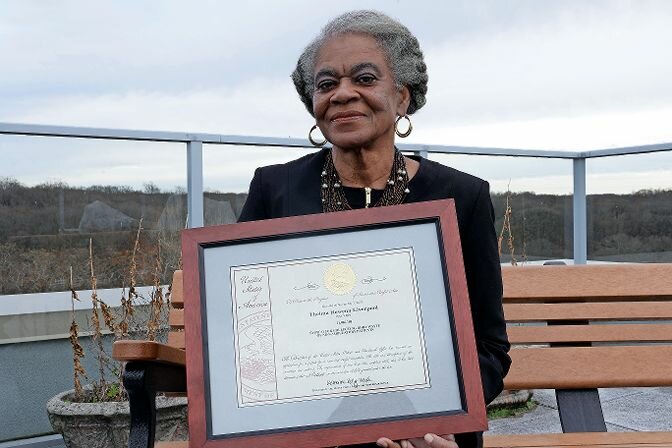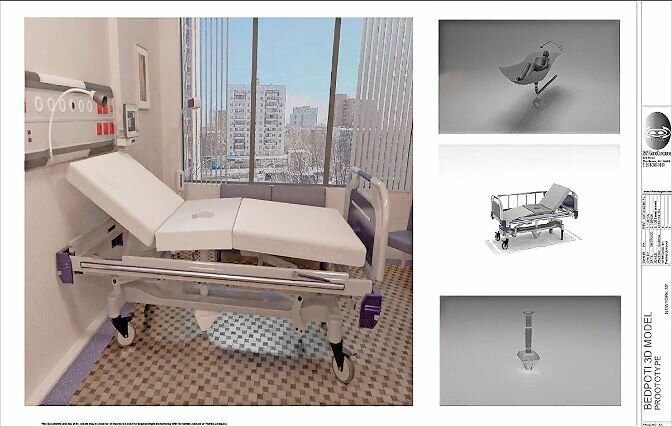Riverdale resident Thelma Liverpool patent a gift for some
The ‘bed poti’ allows non-ambulatories better bowel movement control
When Riverdale resident Thelma Liverpool saw firsthand how difficult it was to take care of somebody who was bedridden, she came up with an idea that would help caregivers and patients alike. That idea is a device to help collect body waste of non-ambulatory patients.
On Nov. 7 the patent she filed in 2020 was finally granted.
“It was a couple days after my birthday,” Liverpool told The Riverdale Press. “Someone said ‘I have news for you.’ I said ‘what?’ He said, ‘it’s been accepted, and I was like ‘Oh yeah! Happy birthday to me.’”
Liverpool is a 79-year-old retired DuPont scientist and the president of the home-based Thanni Holding Corp., a woman-owned and minority-owned small business corporation with the goal of bringing innovative products to the market. The system that she created allows bedridden patients to have their bowel movements in bed via a hole connected to a tube and a drainage collector. The device can also potentially be converted into a bath, allowing patients to bathe in place. There is also a version with a wheelchair, similarly intended to allow patients more autonomy and dignity.
“The whole thing started because I had a landlady whose husband was very sick and eventually became bedridden,” Liverpool recounted. “So for about two to three years, I kind of lived everyday seeing what she went through to take care of a bedridden husband. He was like 6 feet tall, 200 pounds. They were both in their 70s and 80s.
“She had to get help to do things,” Liverpool added, “and use the hoist and other things that have happened, the bathroom stuff and all that and I kind of said, you know, this doesn’t have to be this way. Maybe I can make a difference here.”
From there, Liverpool, a graduate of Howard University and Fisk University, went to the drawing board, creating designs and illustrations. When she searched online to see if she was potentially copying someone else’s idea, she was surprised to find out her idea was the first. While some patents were close, none did what hers did.
She filed a provisional patent with the U. S. Patent and Trademark Office. A provisional patent is to tell the government that you have a great idea and protect it, Liverpool explained, but only lasts a year. Before that period ends an inventor must apply for a permanent patent. Liverpool filed her patent in 2020. One of the reasons the process can take so long is that the examiners have to make sure that it is an original idea.
When Liverpool heard the good news about her patent being granted she gleefully shared the news with her neighbors at her 6469 Broadway apartment, taking pictures with them and her plaque, and showing them a video of how the design worked.
“A lot of (caregivers) who take care of people as people become bigger and older and heavier, they wind up with back problems themselves,” she said. “So you help the caregiver because you don’t have to be lifting. Even if you have hoists, there are times when you do have to lift the person up physically and that could be a problem.
“It’s a pain point for givers. There are times when they will slip and fall because the person is kind of soapy… So you’re trying to say, well, you know, let’s kind of take the other way and make this job a little easier.”
Liverpool tried to copyright the name “bed poti” for the device but was unable to. She still plans, however, on trademarking the name.
One potential benefit of the device is for the environment, Liverpool explained. “What do you with (diapers)? They go to waste,” she said. “So if you cut down on the use of that, or you can actually have this hooked up so it hooks up to the bathroom. If you’re rich enough, got a big enough house that you can have it lead into the bathroom to a wall or something. And so you don’t even have to collect anything.”
While Liverpool’s original idea was for the device to help home caregivers, she believes it could also be used in nursing homes or medical institutions. Because the device offers non-contact with infectious waste and isolation, it could be useful amid viruses like Ebola or Covid-19. It could also help post-surgical who don’t want to be touched.
Liverpool said that not even she’s aware of all of its potential uses.
She now has four people working with her at her home-based company. The team includes her niece and secretary Kim Ray, two local university professionals Darlene Dickson and Shirley Kablan, and CEO of VR Stratagem Pablo Alvarez who uses artificial intelligence to help create 3D printed prototypes of the patented product. Liverpool showed The Press all of her papers and books at her home office. She also showed the very first 3D printed parts of the “bed poti.”
Liverpool and her colleagues already have ideas for the patent, such as designing special bedding and clothes, and they are confident that health care institutions will find their concepts useful. Liverpool was born in Guyana, then British Guyana, before it came independent in 1966. She left the country that year to attend Howard University, then returned to Ghana, got married and came back to the United States.
She worked as a scientist and safety and health consultant at DuPont for 20 years, and then served in the Peace Corps in South Africa for over three years. When she returned to the United States yet again, she knew she didn’t want to work for somebody else anymore. In 2015 she created Thanni Holding Corp.
“It’s something that’s you know, I think it will be part of my legacy that I’m leaving behind,” she said of the Bed Poti. “You know, (what) God gave me, I’m putting it back into something. People will say ‘Oh, I’m glad I got this.’ It makes a difference. If somebody says it makes a difference and ‘I don’t have to lift anymore,’ it changes somebody’s life for the better? It means a lot.”









